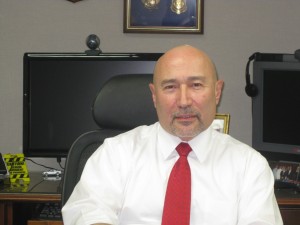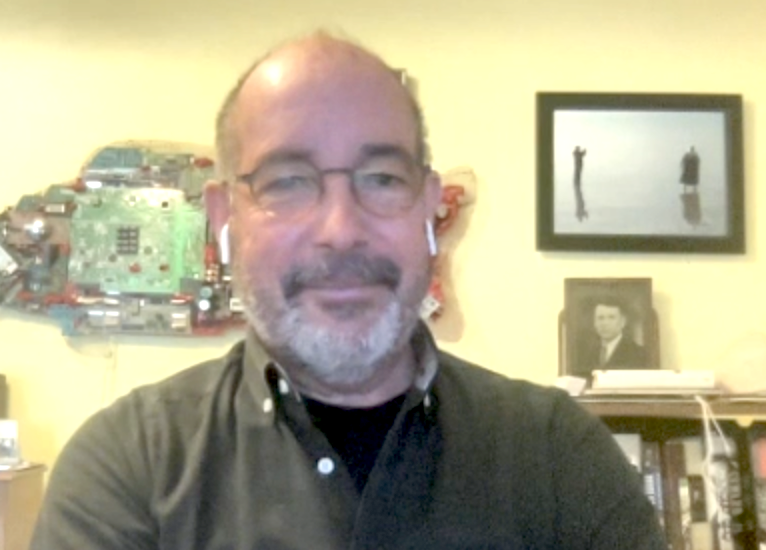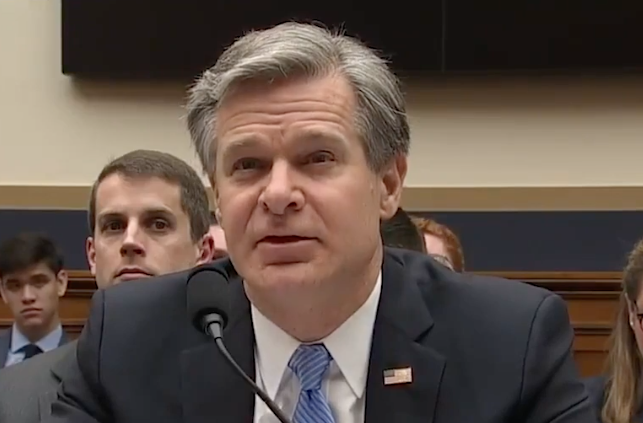
WASHINGTON — Earlier this month, on the 5th floor of the FBI’s Washington Field Office, in the shadow the nation’s Capitol, John G. Perren, special agent in charge of the Counterterrorism Branch, talked to ticklethewire.com editor Allan Lengel about lessons learned since Sept. 11, about the challenges the Internet has posed for terrorism investigations and the dedication he expects from his agents who work the endless leads and reports of suspicious activities that flow into the office.
He also expressed concerns about the potential links between terrorists and drug and human traffickers in Mexico.
“What concerns me is the infrastructure that’s already in place at the Mexican border. You have human traffic lanes already established. You have tunnels for transporting drugs. What’s to say they can’t be contacted by some terrorist organization who wants to use those human trafficking lanes to bring in operatives, to bring in people under the radar?”
Perren is no stranger to counterterrorism. He was supervisor of the Washington Field Office’s Joint Terrorism Task Force and then assistant special agent in charge. In 2005, he spent a half year in Iraq as the FBI’s on-scene commander before returning home to headquarters to become section chief of the Weapons of Mass Destruction/Domestic Terrorism Operations Section. In 2007, the former D.C. cop was named special agent in charge of the Counterterrorism Branch at the Washington Field Office. He has twice filled in as acting head of the field office.
The following is a condensed version of the conversation. The questions have been edited for clarity.
You’ve been dealing with terrorism for along time. How do you see the bureau evolving since 9/11? Does it seems like a different FBI than it was than in 2001?
I really believe it has changed. When I started with the Joint Terrorism Task Force (JTTF) with the Washington Field Office, we only had 9 agencies on board the task force. On the morning of Sept. 11, we had 17 agencies on board. When I left in 2005, we had 34 agencies on board. And when I came back three or four years later, we still had 34 which told me any agency that was in the Capital region that could bring something to the fight, we had on the JTTF. It’s a perfect venue to share information, to share intelligence. What I’ve seen the bureau do is not just to respond to an event. The bureau has matured. How we’ve come along, is we prevent events from happening. If we’re responding we’ve messed up that part of our job. We’ve made a mistake.
What we’re doing now is we’re using intel, we’re sharing information, we’re digging to prevent, to detect, to dismantle these organizations. We’re intelligence driven.
Can you be more specific?
We’re part of the intelligence community. My day for example starts out, I come in, I look at all the intel cables that are coming in. I look at all the intelligence reports, then the SACs (special agents in charge) go for a morning briefing about 8 o’clock. We get an intel brief from our analyst who sits at the table and tells us what’s happening not only here in our area of responsibility, but in the Middle East. We’re responsible for the Middle East, Afghanistan and Iraq. And part of Europe. Whatever happens over there, whatever is developing over there intel wise, that has an impact on us here. We have to cull through all that intelligence to see what is affecting the homeland and what is about to affect American interests or citizens over there.
Have you seen any difference in terms of the focus, some of the intel showing terrorists focusing more on Europe or the U.S.?
We work with our partners in Europe and they are also on the radar for this terrorist activity, but we know when they talk about the west it’s the U.S. and their allies. We take that very seriously.
What’s going on here that concerns you?
Self radicalization. What concerns me are individuals living here who have the ability to utilize the Internet. They go on the Internet and they go on websites , they’re radicalized through these websites. They may have limited travel or not traveled at all overseas. But because of the advantages of the Internet, they may be able to share recipes; When I talk about recipes, how to make bombs, what components to use. Where to purchase them from, how to get them, how to test them , what works best. They can get it through Google, through Earthnet.
What does that all mean for you?
The pre-op surveillance portion of it where they have a chance of getting caught; It’s limited now because they can do all that on the Internet, which limits our ability to disrupt them during the pre-op surveillance. When I say pre-op surveillance, not just casing out the place, but casing out where to buy the precursors, where to transport whatever they’re going to need to make something bad or nefarious. They can do all that on the Internet, do it in their house, and right when they’re ready to execute, just walk on out. It’s the new battle ground. It’s something that we’re very concerned about.
How are you dealing with that?
We recognize that we have to work and be aware of what’s happening over the Internet and form disruption and prevention plans on that plateau, that new fighting ground. We must understand at the FBI or any U.S. government agency that this technology is out there, this technology is going to grow. We need to grow with it.
And how do you go about doing that?
I can’t really discuss without exposing techniques. And when we do disrupt and prevent some sort of nefarious act, we’re also looking at what this person is doing over Internet, who he’s been communicating with. We know there’s a bigger picture.
You had the subway sting case recently where a man was charged with plotting to blow up the Metro system. How do you make a determination in these types of cases as to how far you play it out before you pull the plug and make the arrest?
The key word is predisposition. Is this person predisposed to do this? The question always is, at what point and how far do we go before we let this person get too far in what he wants to do? It’s a fine line. If we wait too long, we may miss something. So we have to find the sweet spot.
Does it bother you to hear criticism? I saw a column in the Pittsburgh paper the other day where the columnist said the FBI should go after real terrorists. He was referring to the Portland FBI sting involving the guy who wanted to detonate a bomb during a Christmas lighting ceremony. How do you respond to criticism that the FBI is turning some lost souls into big terrorists?
That’s what the terrorists want to do. The terrorist want to do is get people who are westernized , they want to get to people that live in this country, who are very familiar with certain neighborhoods, certain cities, and again that cuts out on pre-op surveillance, the pre-op opportunities to catch these individuals because this person already knows the neighborhood. So what they do is they’re reaching out through these jihadist websites, they reaching out on the Internet, they’re trying to focus on this particular type of person. And that’s where all their propaganda is going toward so they can hopefully recruit someone. That person may never have been on our radar for anything.
Do you get a sense that groups like al Qaeda and al Shabaab have representatives in the Washington area and elsewhere in the U.S.?
Not to talk about specific cases. We cannot rule out that operations out there may have contacts here. There may be people here that they go to for direction, people here who are doing the recruiting and possibly trying to send them overseas for training. And then we can’t rule out the fact they can do it over the Internet also.
In terms of the nexus with drugs and terrorism, what type of things are you seeing?
I’m not seeing that in the National Capitol Region. What concerns me is the infrastructure that’s already in place at the Mexican border. You have human traffic lanes already established. You have tunnels for transporting drugs. What’s to say they can’t be contacted by some terrorist organization who wants to use those human trafficking lanes to bring in operatives, to bring in people under the radar?
Whatever ways they bring in drugs, how do we know they’re not going to bring some sort of precursor, some sort of components, some sort of device already constructed over the border and brought here, and again using the established infrastructure . That really concerns me.
Is there indication that’s happening?
I haven’t seen it but it’s something that concerns me.
Overseas, in Iraq, what is the FBI Washington Field Office’s role?
Afghanistan and Iraq are our areas of responsibility. I send agents through Afghanistan and Iraq on 60 to 90 day TDYs (tours). And they work hand and hand with the military. They conduct interviews of high value detainees. It’s a mission I personally was on in 2005 and it’s still going strong . I think the military recognizes how they can use us. It’s a necessary mission. To get that intelligence, to get that knowledge, not just not the tactical intel, what’s going to happen to coalition forces, which is very important.
Any tactical information we immediately give it to the military. But we’re looking for the big picture as far as what threats are against the homeland, that’s why wer’e there. Any sort of threats, any sort of intelligence that we get from these interviews we make sure we share with the entire intelligence community. We just don’t just keep it in house.
In the past you saw the criticism that we got information but we kept that information to ourselves. Now we immediately send it out to the community and the community does the same with us.
Worldwide?
Yes.
Is there a trust with all countries involved in terms of sharing information?
With the allied countries, sure there is.
In terms of the intelligence coming out of Iraq, I assume there was an abundance of intelligence you came across in the very beginning . Has that changed in terms of the quality of intelligence, the amount of intelligence?
I think the intelligence has always been there. But we’re able to harvest it, bring all that intelligence in. Now the next challenge is how to we analyze all that information.
Has the bureau become more sophisticated in sorting it out?
Our intelligence division, for example, used to be one squad around the year 2000. Now it’s an entire division. We have embedded analysts in all the operational squads. I talk everyday with the special agent in charge of the Intelligence Division. We talk about better ways to share, better ways to work, better ways to embed our folks with each other. Is this intelligence we’re getting good? Are we putting it out there in a timely manner? Is counterterrorism and intelligence working together?
It is and we’re working it real well together. A lot that’s personality driven. What we need to do is get beyond personality driven. We need to get to a point where no matter who’s at the helm, this interaction is going to occur.
In terms of tips since Sept. 11, like people standing in front of government buildings in D.C. taking photos. How has that changed as to how you respond to those things?
Any sort of terrorist tip, suspicious activity, any lead call in goes to the Guardian Squad, which has agents and task force officers. So you’ve got a lot of experience there. They take these and run them into the ground. If it pans out to be something, and if it’s something that’s going to be long term or something that’s affiliated with another case, that’s what they have to take into account. They talk to all the other counterterrorism squads. They give them information. I have staff meetings three times a week. One of the things we do, maybe once a week, the Guardian Squad goes over what they had, what calls came in, what rises to the top, so everybody can hear it.
Information is out there. When there’s a heightened sense of security or there’s a heightened sense of awareness, yes, the calls spike. But we’re ready for that, we’re used to that. In the nation’s capital you’re going to find at every corner somebody with a camera taking a picture. So that’s the price of operating in a free society, they’re allowed to do that.
Has that changed much? I know some people feel paranoid about taking a picture in certain parts of Washington. Has the bureau lightened up a little about that type of thing?Again, we’re not going to personally go out there and if you’re taking a picture, talk to you. We’ll start an investigation because of a call, because of suspicious activity. We look at each report, each fact, and we weigh it on its own. Bottom line is we’ll end up usually interviewing a person and if the person gives us a good reason why they were doing something, we’re fine with that, and that ends it.
But if we start investigating this and all of a sudden other tentacles start going out to other areas and we start getting concerned, we do an assessment and after an assessment we go into an investigation if necessary or we just park it, and we’re done with it.
This was a big phrase a few years ago “ no lead goes unaddressed.” We still operate on that. Every lead that comes in, we document it, we track it.
What have you learned from doing that?
Anything that comes in we’re accountable for. What I tell new agents when they come in here I tell them about due diligence. I talk about a sense of urgency. I don’t care how mundane or what time in the afternoon you get this call or what time at night, we will work it all the way through. That’s the kind of people I want. I want passionate people who will give 110 percent.
I’ve spoken to some veteran agents about the new agents and the veterans who think some of the new agents have a different attitude, less of a dedication to the FBI than the veterans. Do you see a difference in commitment to the bureau?
I’m going to go on personal experience. I meet every new agent that comes into my counterterrorism division. I give them about two or three days to be able to find their way around the office. Then they’re in my office and I talk to them about Sept. 11 and the counterterrorism world what happened. That how I believe in this , that we’re in war, this war is going to go on for decades, you’re going to be away from your families or your significant others or your loved ones quite a bit, you will be sacrificing time, and be away from other things you want to do. This just doesn’t end at 9 to 5. It’s not the Federal Bank of Investigations, it’s the Federal Bureau of Investigations. I haven’t been disappointed in any of these new agents or analysts, they’re eager to do it, they can’t wait to do it. The busier they are the happier they are. And the report I get from the supervisors is that these are outstanding young men and woman. They come into the bureau and they really want to do their part.
When you tell them the war on terrorism is going to go on for decades, is that depressing?
It’s reality. This fight started pre-Sept. 11. Obviously if you want to use a milestone or a benchmark of Sept. 11, we’re not even done with the first 10 years yet. This is going to take time. This is going to go on and on. Those who wish to cause us harm are not going to let up, they’re very persistent, they’re very smart. And they want to do harm to us. And we have to stop them from doing that.
In the 10 years since Sept. 11, is there one thing that stands out as a lesson?
Anything you’re working, always keep in mind, any case, any investigation, any lead, any person, there’s a bigger picture, there’s a global picture. That’s why you need to talk to your analysts, that’s why you need to share the information because you need to know what the bigger picture is. If you think you’re saving the day by stopping something now, you need to coordinate with headquarters, you need to coordinate with the intelligence community, you need to get the global picture. How is this going to impact the rest of the world? I think that’s what we’re seeing, that’s where we’ve really improved. That’s what we’re doing ,even here in the Washington field office, before we take down an operation, we’re not going to headquarters for a mother may I, we’re going to headquarters so they can ensure us we’re not having a negative impact on any of our sister agencies, we’re not having a negative impact on any other operation going on. That’s how I think the bureau and actually the entire intelligence piece has really grown since Sept. 11.
This office has had meetings with the Islamic community. Are you still doing that and has that relationship been challenging?
When you reach out into the community, number one, it’s always a question of trust. We have to remember the fight against terrorism is multi-dimensional in approach. It’s not just your law enforcement approach.
Sometimes the Islamic community has been very critical of the FBI.
That will happen with any community until we establish trust. We have to establish trust and build relationships. That’s a constant effort on both sides. I think the more we work with each other, the more we understand each other, the more we explain to each other what are roles are, what the cultures are, where the clashes are. We have to constantly work at it.
What do you say to people in the Islamic community who complain the FBI is spying on them, planting informants in mosques?
Again, what we do, we go visit the community, we’ll address those questions. Again, what we have to do is develop trust. We’re not here to spy on you. We’re here to elicit your help.
What about informants in the community?
If you’re worth your salt, anything you’re working, whether its drugs, whether it’s crime, whether it’s terrorism, you’re going to use human sources. I’ll leave it at that. We’re looking for the bad. What we’re looking at is those who wish to cause us harm. We’re looking at someone which the community itself would identify as a terrorist, not just us.
In terms recruiting for agents, it seems still 10 years later there’s still a dearth of agents who speak Arabic, Farsi, Urdu and other languages.
It’s something we have to work at, I don’t think we have nearly enough. We are really making an effort.
Do you have Arab agents in the Washington Field Office?
My assistant special agent in charge, he’s Lebanese, he speaks Arabic. My other ASAC is Egyptian.
Is it tough?
Sure. But I know in the last two or three years I’ve see an uptick, a lot my agents here on my side of the house, a lot of the younger ones do speak Farsi, do speak Urdu. It’s going up but it’s not enough. We’re working it. A lot of times we lose out to the highest bidder, which is the private sector. That’s a reality, that’s a challenge.
Domestic groups. What’s your sense on how they’re doing these days?
I just gave a speech or welcoming remarks at Northern Virginia College before I think about 350 state, local, federal officers and analysts. I talked to them about domestic terrorism. I describe what I call the perfect storm: the economy is down. We have an African American who is president. We have a lot things going wrong that feeds into that hate, that feeds into that rhetoric. They’re looking for a scapegoat. We have a domestic terrorism squad, that we have to be just as aggressive and try to get sources, try to cover all the investigative bases, try to make sure we’re not missing anything. The perfect example is the Holocaust museum shooting. He was a supremacist, he was a lone wolf and flew under the radar. So domestic terrorism is alive and well.
Have you noticed more activity, have you seen more things on the chats and more websites popping up?
Yes, I think we are seeing an uptick in all of that.
In this area or all around the country?
I’d say all around the country. That would include us. I know I’ve tasked my domestic terrorism squad, I want to see our source base built. I want to make sure we don’t have another Holocaust shooting. He was a supremacist, he ranted and raved but in this country you have the right to rant and rave on the Internet. You may not like what he has to say but he has that right, so we need to find out when do you go beyond that right and you’re planning something to harm the public.
Off on another subject. The Justice Department’s Inspector General found that agents around the country cheated on a test on the guidelines involving domestic terrorism surveillance. Three former top officials in this office were implicated. Has that scandal impacted moral?
Without speaking directly to that what I can say is anything negative in the paper that has to do with the FBI, I think yes, it’s going to have an impact on the agents. All the agents I know come in here and work a long hard day and they put their heart and soul in it and things like that do have an impact.





